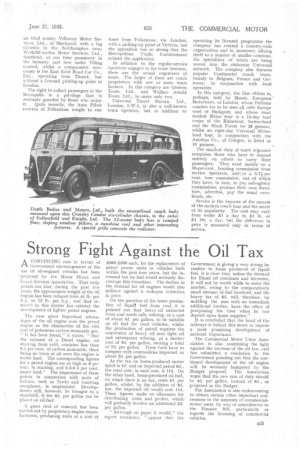Strong Fight Against the Oil Tax
Page 39

If you've noticed an error in this article please click here to report it so we can fix it.
ACONVINCING case in favour of Government encouragement of the use of oil-engined vehicles has been '.prepared by the Motor Hirers and Ccach Services Association. That body points out that, during the past five years, the approximate weight of the oil engine has been reduced from 41 lb. per hp. to 13 lb. per h.p., and that research in this matter has assisted the development of lighter petrol engines.
The case gives important advantages of the oil engine over the petrol engine as the elimination of fire risk and of poisonous carbon-monoxide gas. "It has been found," it states, " that the exhaust of a Diesel engine, on starting from cold, contains less than 0.1 per cent. of carbon monoxide, there being no trace at all once the engine is under load. The corresponding figures for a petrol engine are as high as 8 per cent. in starting, and 0.3-0.4 per cent. under load." The importance of these points in connection with units of defence, such as Tanks and bombing aeroplanes, is emphasized. Developments will, however, be brought to a standstill, if the 8d. per gallon tax be placed on oil fuel.
A great deal of research has been carried out by proprietary-engine manufacturers, producing units at a cost of £300-£500 each, for the replacement of petrol power units in vehicles built within the past four years, but the increased tax on fuel would seriously discourage this transition. The decline in the demand for oil engines would also militate against a welcome reduction in price.
On the question of the home production of liquid fuel from coal, it is pointed out that heavy oil extracted from coal needs only refining, at a cost of about 4d. per gallon, to be suitable as oil feel for road vehicles, whilst the production of petrol requires the conversion of heavy oil into light oil and subsequent refining, at a further cost of 3d. per gallon, making a total of 7d. per gallon. These fuels have to compete with commodities imported at about 3d. per gallon.
As the tax on home-produced motor spirit is 4d: and on imported petrol 8d., the total cost, in each case, is 11d. On the other hand, home-produced oil fuel, on which there is no tax, costs 4d. per gallon, whilst, by the addition of 8d. tax, the imported oil would cost lid. These figures make no allowance for distributing costs and profits, which will probably involve an additional 2d. per gallon.
" Although on paper it would," the report continues, " appear that the
Government is giving a very strong incentive to home producers of liquid fuel, it is clear that, unless the demand for Diesel oil continues and increases, it will not be worth while to enter the market, owing to the comparatively small amount of fuel involved, and the heavy tax of 8d. will, therefore, by wAldling the user with an immediate additional burden, have the effect of postponing the time when he can depend upon home supplies."
It is concluded that the hand of the railways is behind this move to impede a most promising development of national importance.
The Commercial Motor Users Association is also continuing the fight against the increase 'of the oil tax, and has submitted a resolution to .the Government pointing out that the continued development of the oil engine will be seriously hampered by the Budget proposal. The Association urges that the new rate of duty should be 4d. per gallon, instead of 8d., as proposed in the Budget.
The Association is also endeavouring to obtain certain other important concessions in the interests of commercial-. motor users, by way of amendments to the Finance Bill, particularly as regards the licensing of commercial vehicles.




























































































